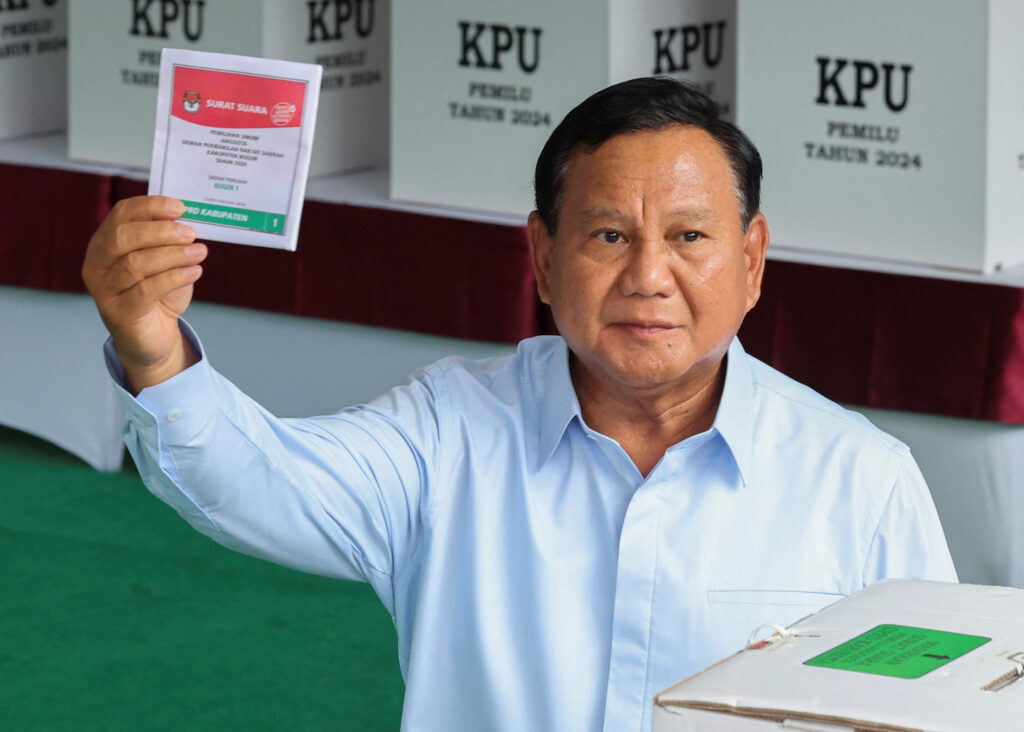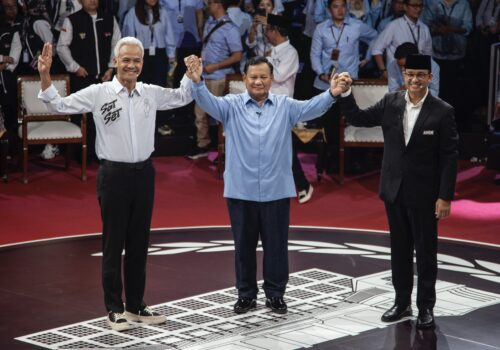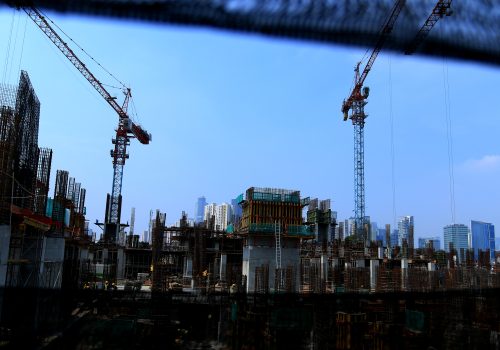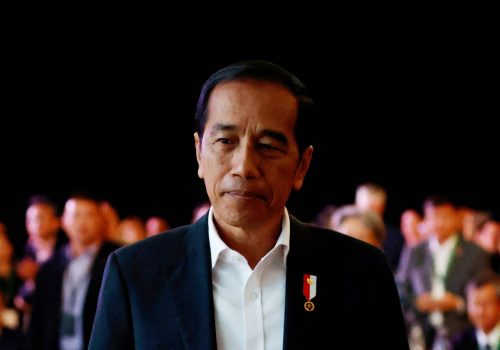Third time’s the charm. Indonesian Defense Minister Prabowo Subianto is poised to be his country’s next president, with projections showing him easily clearing 50 percent in Wednesday’s election. The seventy-two-year-old Prabowo, in his third bid for the presidency, is a former general who has faced allegations of human rights abuses and was associated with the country’s longtime dictator, Suharto. But Prabowo effectively softened his image for the campaign—and drew on the tacit support of popular outgoing President Joko Widodo, whose son is Prabowo’s running mate. What can the world expect from a President Prabowo? How will he position the world’s third largest democracy in regional disputes and global issues of concern? We polled our experts for their thoughts.
Click to jump to an expert analysis:
Josh Cartin: Prabowo victory gives the US another chance at better security and economic engagement
Parker Novak: Prabowo is poised to lead a nation on the rise
Prabowo victory gives the US another chance at better security and economic engagement
Prabowo appears to have won an impressively strong victory in Indonesia’s presidential elections this week, bringing to a close after one round of voting this demonstration of democratic commitment by the people of the world’s fourth-largest country.
This was not Prabowo’s first presidential campaign, having placed second to President Joko Widodo (“Jokowi”) in both the 2019 and 2014 elections. Prabowo’s decision to “run with” Jokowi in this year’s election appears to have made the difference. This was not a mere matter of his pairing with Jokowi’s eldest son, Gibran Rakabuming Raka as his vice presidential running mate. He also adopted an electoral platform that emphasized policy continuity with the current president, who at the end of last year, after nine years in office, enjoyed favorability ratings of more than 75 percent.
Some may be tempted to focus on the president-elect’s association with past abuses by elements of the Indonesian military during the country’s difficult democratic transition, or on the continuing role of dynastic politics in Indonesian democracy. The urge to cast stones should be resisted. Prabowo’s victory and a next administration that extends Jokowi’s pragmatic focus on Indonesia’s economic development, job creation, and improvement in human capital will give the US government and private sector another opportunity to engage after the inadequate attention Indonesia has been given during much of Jokowi’s term in office.
Prabowo’s defense background—including formative US Army training—should prompt the United States toward fast action in identifying ways to support Indonesia’s growing capabilities to surveil and defend the sovereign territory of its vast archipelago. At the same time, the United States must remember to respect the determined independence and nonalignment of this strong and diverse democracy, a country quietly capable of making important, positive contributions to the stability and prosperity of the Indo-Pacific region and the world.
—Josh M. Cartin is a nonresident senior fellow with the Scowcroft Center for Strategy and Security’s Indo-Pacific Security Initiative. He is a former deputy senior director for East Asia at the National Security Council, and he served as the first deputy representative at the US Mission to the Association of Southeast Asian Nations in Jakarta, Indonesia. He is currently a partner at the risk intelligence and strategic advisory firm TD International LLC.
Prabowo is poised to lead a nation on the rise
Since Suharto’s resignation in 1998, Indonesia has become a vibrant, if imperfect, democracy. Voters are closely engaged in the democratic process, as evidenced by high turnout rates for elections, and elections are broadly seen as free and fair. It isn’t without flaws, however. Corruption, collusion, and nepotism—popularly abbreviated as KKN in Indonesian—remain pervasive.
Wednesday’s elections were defined by the presidential contest, seemingly won by Prabowo, the sitting defense minister and a retired general with a checkered past who symbolizes the political resurgence of Suharto-era elites. He handily defeated two high-profile former provincial governors, Ganjar Pranowo and Anies Baswedan, by courting young voters and softening his image.
Prabowo was greatly aided by the tacit backing of the outgoing president, Jowoki, who maintains sky-high favorability ratings as the sun sets on his time in office. Prabowo harnessed Jokowi’s popularity by framing his candidacy as a de facto continuation of the incumbent’s presidency, going as far as to name Jokowi’s son, Gibran Rakabuming Raka, as his running mate.
Quick-count results show that Prabowo is on track to secure an outright victory with well over 50 percent of the vote. To avoid a runoff, he also needs to secure more than 20 percent of the vote in at least twenty of thirty-eight provinces, which seems all but assured. Prabowo has already declared victory and, assuming the official results reflect the quick counts, will take office in October.
Prabowo is poised to inherit the mantle of a nation on the rise. With a young population of more than 270 million people, Indonesia is projected to become the world’s sixth-largest economy by 2027 and an increasingly important geopolitical player by virtue of its growing economic heft and geographic location astride key waterways.
Indonesia’s ascendance isn’t a done deal, though. Whether it be economic development, geopolitical competition, or climate change, the sprawling archipelago faces a series of daunting challenges that could derail its rise. As Prabowo takes office, he will need to deftly navigate them and harness Indonesia’s advantages to deliver results for a citizenry that is hungry for opportunity and a better life.
—Parker Novak is a nonresident fellow with the Atlantic Council’s Global China Hub and Indo-Pacific Security Initiative. He previously served as the Indonesia and Timor-Leste country director for an international nongovernmental organization.
Prabowo could grow Indonesia’s economy by leaning into demographics and diversification
Prabowo inherits a dynamic and aspirational economy—poised to become the sixth largest in the world in mid-2026, and hoping to be in fifth position by 2045. Indonesia has enjoyed a steady recovery and robust growth outlook hovering around 5 percent. It has bucked some emerging market trends—maintaining a relatively stable fiscal situation, including a debt-to-gross-domestic-product ratio of 39 percent, amid weakening credit and rising debt distress among many peers. While China is one of its largest investors and trade partners, Indonesia eschewed joining the expanded Brazil, Russia, India, China, South Africa (BRICS) grouping last year. Its decision not to join is seen by some as a move to maintain its nonalignment and signal its interest to keep, if not strengthen, its role in the multilateral system, while diversifying and increasing its foreign direct investment and trade. At the same time, Indonesia has been among the stronger voices from the Global South for increased influence in international economic governance, an effort Prabowo is likely to continue. Concerns about his lack of economic expertise or experience might be tempered by having seasoned economists and technocrats on hand.
Internally, demographic factors will be at play in the economy. Indonesia has the world’s fourth largest population, and it is still young—half the population is under age thirty—but Jokowi’s family planning initiatives are taking hold and birth rates have started coming down. Prabowo has an opportunity to convert Indonesia’s young workforce into a growth machine, especially with investments in green and digital transition infrastructure. But he will need to advance policies that prepare youth for quality jobs (youth unemployment is 13 percent) and increase women’s labor force participation (currently 50 percent compared to 80 percent for men). He will also need to manage, if not optimize, urbanization and improve productivity and conditions in the large informal sector, which is dominated by women and youth.
—Nicole Goldin is a nonresident senior fellow with the Atlantic Council’s GeoEconomics Center.
Further reading
Sun, Feb 4, 2024
Who will lead Indonesia after Jokowi? The world’s third-largest democracy is about to decide.
New Atlanticist By Parker Novak
On February 14, Indonesians will choose among Prabowo Subianto, Ganjar Pranowo, and Anies Baswedan. And even more than the next president is being decided.
Thu, Aug 31, 2023
Indonesia’s economy will surpass Russia’s sooner than expected. Here’s what that says about the global economy.
Econographics By Josh Lipsky, Niels Graham
In 2026, Indonesia is expected to surpass Russia to become the world’s sixth largest economy
Thu, Nov 9, 2023
Jokowi comes to Washington with a sensitive yet promising to-do list
New Atlanticist By Parker Novak
The Indonesian president, an infrequent overseas traveler, is expected to meet with US President Joe Biden at the White House on November 13.
Image: Presidential candidate Prabowo Subianto votes at a polling station during the general election in Bogor, West Java, Indonesia, February 14, 2024. REUTERS/Kim Kyung-Hoon



